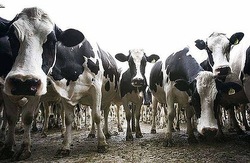The Age | 6 March 2011
by Ruth Williams
AUSTRALIAN meat company Teys Brothers is the country's second-biggest beef producer. Every year, it converts more than 1 million cattle into steaks. It is a major exporter, an employer of thousands of Australians, and its operations span three states.
If predictions hold true, the 65-year-old company will also soon be the latest big Australian food business to be targeted by a multinational food conglomerate.
In coming months, mogul James Packer is expected sell his family's half-share of Teys to Cargill Australia, a subsidiary of US-based agribusiness giant Cargill, whose global operations include grains, meat and financial services.
Advertisement: Story continues below
If the deal goes ahead, Teys will still be 50 per cent owned by its founding family.
But it will mean another big investment in Australia's food chain by a big overseas company. The trend has extended from farms to billion-dollar transactions involving giant food processors; it has worried farmers and sparked debate among politicians across the ideological spectrum.
Economists, the government and the opposition are quick to sell the benefits of foreign investment in Australia.
''Foreign investment been an important part of the economic success story in Australia,'' says Matthew Durban, of the Australian Trade Commission.
''Vital'' foreign investment has supported Australian jobs, economic growth and prosperity, says Agriculture Minister Joe Ludwig.
But Nationals MP John Cobb, the opposition spokesman for agriculture, warns that the sale of food processors and marketers to overseas companies is a different case altogether. It is a matter of food security, he says, arguing the nation risks ''losing control of our supply lines'' if the buy-up continues.
''This is not investment, it is gaining total control,'' he says, adding that the trend has increased tenfold in the past three to four years.
In the past two years, grain marketer AWB, sugar producer and refiner CSR (now Sucrogen), and cattle giant Australian Agricultural Co have been bought out by Canada, Singapore and Emirates-based companies.
ABB Grain, a grain marketer and handler, was acquired by Canadian company Viterra in 2009.
Brazilian firm JBS Swift - the world's biggest meat processor - has been on a shopping spree in the meat sector, buying Victoria's Tasman Group, NSW-based Rockdale Beef and lamb processor Tatiara Meat Company.
Also on the cards is a takeover of SunRice by Spanish company Ebro, to be voted on by shareholders in May, and the purchase of AWB's commodity trading operations by Cargill, which still requires Australian Competition and Consumer Commission approval.
After snapping up dairy and juice company National Foods in 2007, Japanese firm Kirin Holdings moved on to trans-Tasman dairy giant Dairy Farmers in late 2008, and Australian beer and wine company Lion Nathan in 2009.
Adding to concerns are reports of state-owned operations from China and the Arab states, among others, scouting for and buying tracts of farmland in Australia - concerns that have been magnified by a lack of data tracking the extent of the investment.
The spate of recent buy-ups is being driven by a record spike in world food prices - in staples such as wheat, rice, sugar and oils - and global concerns about food security. According to the UN's food agency, almost 1 billion people around the world live in chronic hunger, and that figure is expected to rise because of population growth and climate change.
Dr Durban says interest in Australian assets is coming from a range of countries, with such companies as US-based Cargill, Singapore's Olam International , Japanese firm Kirin and Brazilian Swift ''all looking to increase their holdings'' in Australia.
Liberal senator Bill Heffernan is particularly concerned about the reported buy-up of farms by state-owned companies, warning that Australia is threatening its ''sovereignty'' with such transactions. ''If we allow unfettered encroachment on our assets by foreign sovereign funds … we lose control of our destiny,'' he says.
But Mr Cobb argues that foreign ownership of farms - which he says is probably lower now than 50 years ago when British firms owned swaths of pastoral land - is less of a concern than offshore companies gaining control of processors and marketers such as AWB and Sunrice.
''It is much easier to buy [SunRice] than 2000 rice growers,'' he says.
The government has called for ''cool heads'' on the matter. It has commissioned work on whether - in the words of Assistant Treasurer Bill Shorten - ''there is a gap developing between anxiety and reality''.
Later this month, the Australian Bureau of Statistics will launch an ownership survey of 10,000 properties in an attempt to measure the extent of foreign investment in farms. The keen interest in the issue means the bureau will release the results in September, a much faster turnaround than is typical for such a project.
Separately, the Australian Bureau of Agricultural and Resource Economics will study ownership of meat processing, sugar refining, dairy marketing and other high-profile food operations.
Economists like Greg Mahony, from the Australian Catholic University's public policy unit, have urged against resorting to ''protectionist'' responses, warning in a submission to Parliament that such moves could deter crucial foreign investment.
And in a nation that exports 60 per cent of its agricultural production, has a $14 billion food trade surplus and grows 98 per cent of the fresh produce it consumes, the food supply appears to be thriving, not under threat.
But independent senator Nick Xenophon says Australia needs to debate the issue. The senator and Greens deputy leader Christine Milne have co-sponsored a bill to apply a ''national interest'' tests to foreign investment in Australian farms, which would also require data about foreign acquisition of farmland to be published online.
They also want a reduction to the $231 million threshold for takeovers to be referred to the Foreign Investment Review Board.
''It is ridiculously low,'' Senator Xenophon says. ''We are mugs compared to other countries that have very tight controls over foreign investment in prime agricultural land.''














